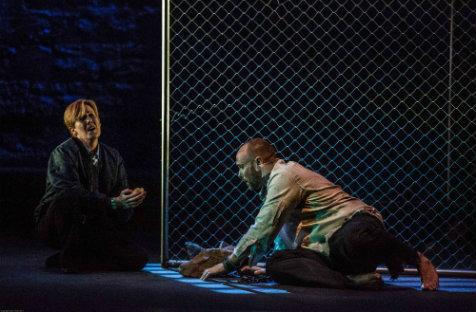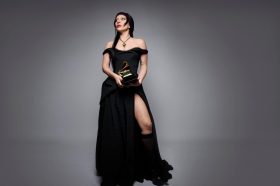Melbourne Opera has successfully transplanted Beethoven’s unique operatic masterpiece into a contemporary setting. Fidelio is a timeless story, dealing with human tragedy and the horrors of tyranny from which people suffer even today. Sung in English, this production is accessible and emotionally powerful.
It comes as something of a surprise when the curtain rises on a shabby modern office with police cells in the background. There is a suggestion of the rustic but nothing of the charm of some productions set in 18th century Germany. The relevance of Fidelio to today’s world is immediately apparent.
Against this backdrop, the office romance of Marzelline, daughter of Rocco, the head warden, and Jaquino, her father’s assistant, is played out. The new assistant, Fidelio, upsets any marriage plans by becoming the object of Marzelline’s infatuation. As Marzelline and Jaquino, Fiona Jopson and Brenton Spiteri made a suitably animated and fresh-voiced pair. It is a policy of Melbourne Opera to provide opportunities to both established and upcoming artists. Jopson’s and Spiteri’s success in the 2012 Herald Sun Aria (third and first place respectively) has given them recognition as notable talents to be nurtured and their performances signaled successful careers ahead. Although their lower registers were sometimes taxed by heavier orchestration, their higher notes were clear and vibrant. Spiteri in particular displayed total immersion in his role, even when not singing.
Less comfortable was Donna-Maree Dunlop as Fidelio, particularly in Act One. Dunlop has a fine voice and dramatic talent, but looked and acted more like something out of Hansel and Gretel than a courageous woman seeking to rescue her husband from death. Leonore is one of the great heroines of grand opera and her noble character needs to be established from the beginning. In her efforts to save her husband Leonore is using Marzelline’s affection to win Rocco’s trust. Surely there should be more reserve and gravity in her demeanor than was evident on Saturday night. Although Dunlop does not have the vocal weight of the Wagnerian voices that usually undertake this role, she sang with conviction and rose splendidly in the ensembles. A difficulty with the end of the demanding Act One aria appeared to be a momentary aberration. Her interactions with Florestan, a crucial focus of Act Two, were very moving.
Among the many highlights of Saturday night’s performance was the opening of Act Two. Under the baton of David Kram, the Melbourne Opera Orchestra’s sensitive treatment of these opening passages and Florestan’s aria captured the pathos of his predicament most tellingly. Particularly beautiful and poignant was Greg Pharo’s oboe playing as it wound through Jason Wasley’s warm, emotional tenor.
Another highlight was the orchestral introduction to the entry of the prisoners as they were released into the sunlight at the end of the first scene of Act One. The chorus itself is a jewel in the operatic chorus crown and to hear it introduced with the depth and feeling that Kram managed to elicit from the lower strings was a joy. A little more quiet wonderment was needed at the beginning of the chorus, but the burst of sunlit thanksgiving was impressively sung. The mixed chorus work and principle singers’ ensemble at the triumphant conclusion of the opera was also heartfelt and uplifting.
Along with Jason Wasley (coincidentally a Sun Aria winner of 1993), Steven Gallop as Rocco and Roger Howell as Pizarro provided a valuable element of experience to the performance. Their strong operatic voices and solid stagecraft added significantly to the quality of the production. The booing (along with the cheers) that greeted Howell confirmed his effectiveness in the role of arch villain.
Fidelio is an ambitious undertaking for a company of limited resources, particularly since the orchestral component is such a huge and important element. David Kram fully embraced the challenge by incorporating the Leonore Overture No. 3 before the final scene. While the playing may not have been immaculate or sufficiently full-bodied at times, Kram’s forces gave a creditable account of the score.
There is a great deal to admire and enjoy in this production. The Athenaeum is an intimate space that brings an audience close to the opera and the composer’s intention. Hugh Halliday’s direction generally works very effectively and Andrew Bellchambers’ sets are imaginative and functional. This is definitely a production worth seeing.
Rating: 3 ½ stars out of 5
Melbourne Opera presents
Fidelio
By Ludwig van Beethoven
Conductor: David Kram
Director: Hugh Halliday
Leonore: Donna-Maree Dunlop
Forestan: Jason Wasley
Rocco: Steven Gallop
Pizarro: Roger Howell
Jaquino: Brenton Spiteri
Marzelline: Fiona Jopson
Fernando: Manfred Pohlenz
Prisoner 1: Shoumendu Ganguly
Prisoner 2: James Payne
Prison Guards: David Lawson-Smith, Peter Sackett
Athenaeum Theatre, Melbourne
2 – 10 February
Alexander Theatre, Monash University
2 March





